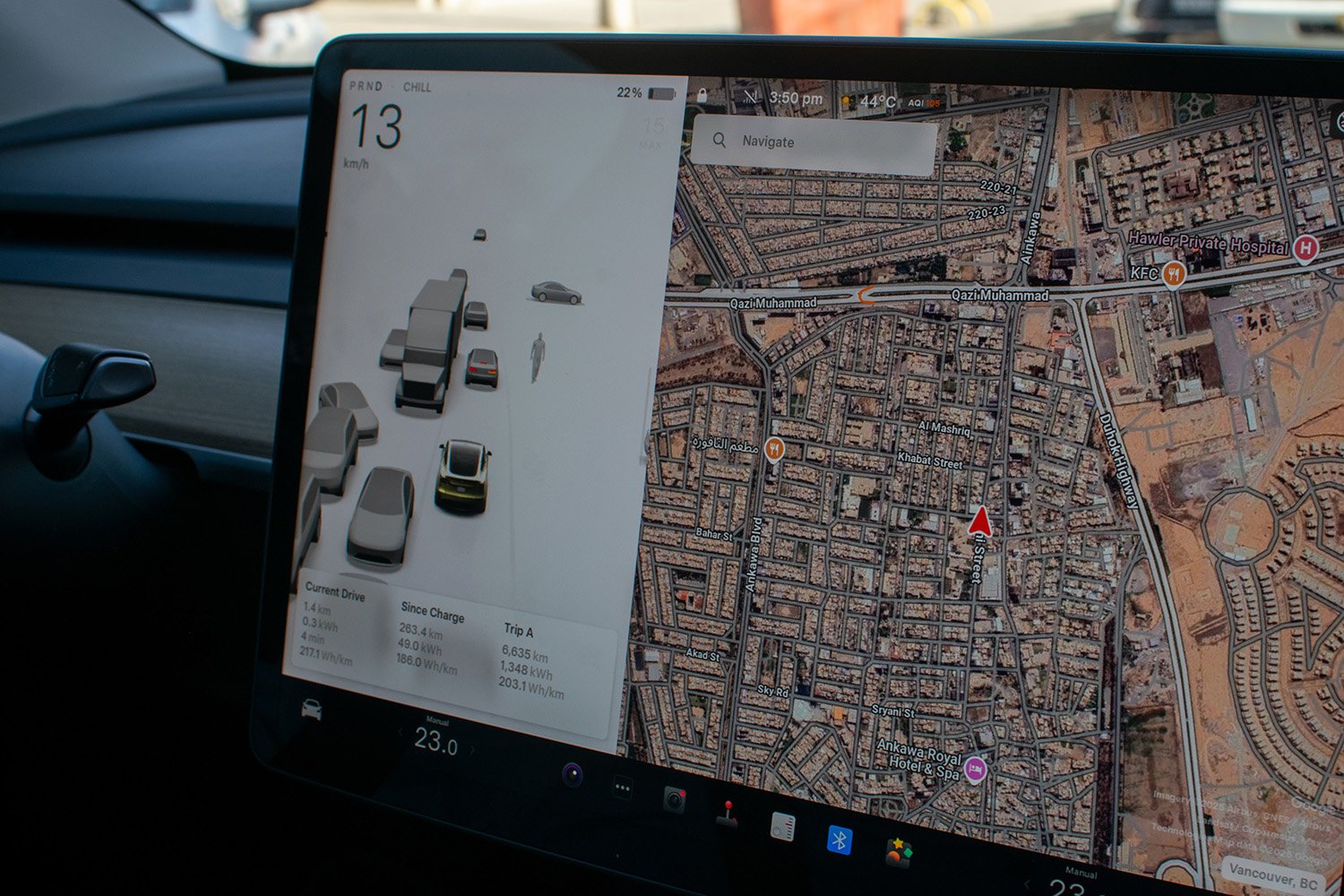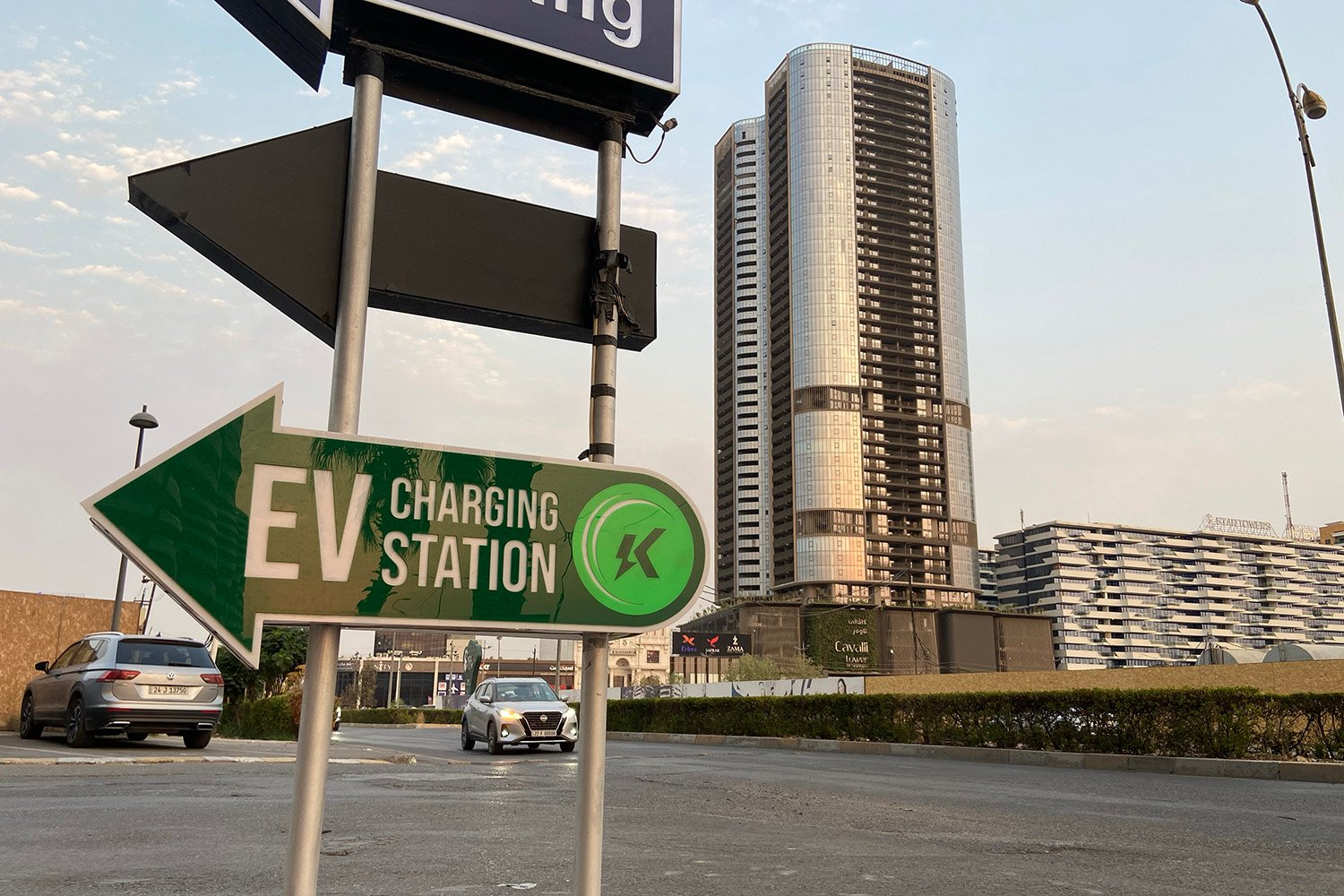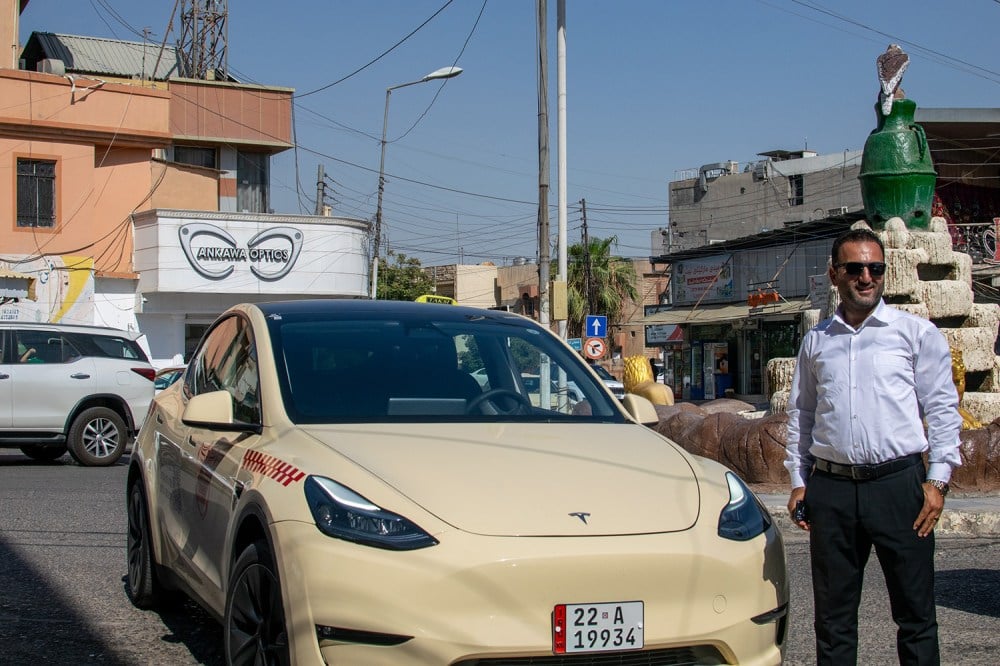ERBIL, Iraq—One day in July, rush hour traffic crowded Erbil’s 60 Meter Street, one of Erbil’s growing number of ring roads, under a smoggy sky. Tan Nissan Sunny taxis merged against the flow of Ford SUVs and Kia sedans. Junky Toyota farm trucks idled next to pricey Land Rovers at stop lights. And Chinese-made electric vehicles from companies such as BYD made up a sizable portion of the traffic.
Iraq’s Kurdistan Region is shifting toward electric vehicles as consumers in this oil-rich place are increasingly considering buying plug-in hybrids and full battery EVs over concerns about the environment, poor quality gasoline, and the cost of traditional cars. And as the region’s electricity infrastructure improves, people are also becoming less worried that they might end up stranded on a remote roadside with an exhausted EV battery.
Chinese automakers are likely to supply most of the new EVs. It is a consequence not only of Beijing’s growing soft power in Kurdistan—long a bastion of U.S. influence—but also of China’s ascent as a major automobile manufacturer in developing markets worldwide.
Earlier this year, Arjang Ibrahim Zebari, a 30-year-old real estate agent, became fed up with the high cost of driving his Dodge SUV back and forth between Erbil, where he lives, and his parents’ house in Duhok. The roughly 100-mile drive between Kurdistan’s capital and its third-largest city takes about two-and-a-half hours. “I spent too much money to come and go and had many problems with the engine and the tires and wheels,” he told Foreign Policy, estimating that his car cost him more than $200 every month on gas and repairs.
Zebari sold his Dodge and used the money to buy a BYD Qin L for $19,000. The plug-in hybrid model manufactured in China has both an electric battery and a gas tank, which combine to give the car a roughly 1,300-mile range on a single charge. He rarely visits the gas station anymore and charges his car once every 15 days for a few dollars, far less than the $45 he used to spend every week to fill his tank, he said.
Zebari is pleased with his purchase and said he would consider exchanging his plug-in hybrid for a full battery EV in the future. “Electric cars are very natural and environmentally friendly. I want to go step by step with international progress, not relying on our traditional things,” he said.

This story would have been absurd to write just a few years ago. In 2021, a local radio station joked on social media that if Tesla ever made it to Kurdistan, its vehicles would have to be plugged into portable gasoline generators. But driving an EV on the streets of major cities such as Sulaimaniyah or Duhok becomes less ridiculous every day now.
For decades, electricity supplies in Kurdistan were highly unreliable because power generation did not meet consumer demand. The energy that was generated was not efficiently transmitted; most people received less than 12 hours of power per day on the public grid. Iraqi Kurds had to endure long blackouts during peak demand periods in the scorching summer and cold mountain winter. They filled the gaps with highly polluting and expensive diesel generators.
That is slowly changing. Last year, the Kurdistan Regional Government (KRG) launched a program to roll out 24-hour electricity across the region by the end of 2026. The program shifts the cost burden from the government to consumers, which the KRG hopes will encourage more responsible consumption and reduce demand. So far, the program operates only in select neighborhoods of major cities and is not yet available in rural areas. Solar power is also becoming more popular for homes and businesses.
This new reliability allows EV and hybrid drivers to charge up at home without breaking the bank. Zebari said it cost him about $3.75 to charge his BYD at home (though he could face higher bills with the new 24-hour program).
For drivers on the go, EV charging stations in Kurdistan are scarce and largely confined to apartment complexes, businesses, and gas stations in the more upscale areas of major cities. But this is hardly a hurdle for a population that is used to adapting to electricity challenges. (Foreign Policy observed a Chinese-made BYD Destroyer plug-in hybrid charging up from an extension cord running from a café through a fence to a public park in Sulaimaniyah.)
The Erbil Traffic Directorate did not respond to a request for statistics on the number of electric vehicles in the region, nor did the KRG respond to a request for data on EV adoption throughout the entire region.
Three years ago, businessman Herish Noori opened a specialty electric vehicle car showroom in Erbil called EV Mall. When Foreign Policy visited, several customers were checking out models of Chinese brands Avatar and BYD. A Kia EV9, which can retail for $80,000 in the United States, was available for the wealthier customers, many of whom—ironically—made their money in oil; Kurdistan has significant oil reserves and currently produces about 250,000 barrels per day.
Noori declined to provide specific EV sales figures but claimed that they have increased year over year. He expects that 25 to 30 percent of all vehicles in Erbil will be electric in the next five years as consumer demand grows.
“Every day, many people ask me about this car,” said Zebari.
The KRG incentivizes the use of electric vehicles in subtle but important ways. It waives both the customs tax for importing EVs as well as registration and annual environmental fees, which together can run more than $1,000 for conventional vehicles, depending on the model.

In the past, the only Chinese vehicles on the streets in Kurdistan were the basic pick-up trucks made by Great Wall and Gonow that were favored by farmers. But in recent years, new logos began to appear. Companies such as BYD, Chery, Geely, Jetour, and the British-born but Chinese-acquired MG are now common sights on streets in the region.
Entirely coincidentally, some other Chinese brands sometimes have Kurdish-sounding names. They include Haval, which means “comrade,” or Bestune, easily mistaken for the common Kurdish name Bestoon.
China is now the largest auto exporter in the world after overtaking Japan in 2023. Its comparatively affordable cars have found a foothold in emerging markets. EVs are a major part of the business: According to the International Energy Agency, Chinese cars constituted 40 percent of global EV exports in 2024, at almost 1.25 million. The value of Chinese EV exports has surged from $295 million in 2018 to $36.7 billion in 2023, the U.S. International Trade Commission reported.
Unlike some other places, such as countries in Europe or East Asia, Kurdistan is not concerned about China’s geopolitical positioning, which can complicate the presence of Chinese businesses. But Chinese brands still have some competition from North American, European, and other Asian companies.
Hemin Ahmed Muhammad drives what he claims is Erbil’s only Telsa taxi. He bought a Model Y directly from the United States; he chose it because he thought the materials and software are superior to Telsa’s competitors, he said. Muhammad is a living rebuke of the radio station’s 2021 gag that the company’s cars could never make it in the region. “My passengers really like it,” he said. “They take [Snapchats], videos, and TikToks and say to me: ‘Good job, every taxi should be a Tesla.’”
But despite such enthusiasm for the U.S. brand, Noori estimated that 89 percent of EVs in Kurdistan are Chinese brands or made in Chinese-owned factories. This largely comes down to price, he said; according to Noori, Chinese brands are about 30 percent cheaper than brands from the United States or Europe. Bloomberg reports that developing economies are among the fastest-growing markets for EV technology, with some claiming “higher adoption rates than wealthier countries.”
Kurdistan is an example of how EVs have become a viable transportation option in places where they were punchlines just a few years ago. Their price competitiveness makes them a real option for consumers, while improvements in electricity infrastructure tip the balance in their favor. They’re now popping up in showrooms around the world, from Brazil to Vietnam—and the trend shows no signs of slowing down.
In Erbil, Muhammad remains confident that his Tesla taxi will be part of a broader trend. “I see the world and everywhere the future is electric,” he said.
The post Iraqi Kurdistan’s EV Revolution appeared first on Foreign Policy.




